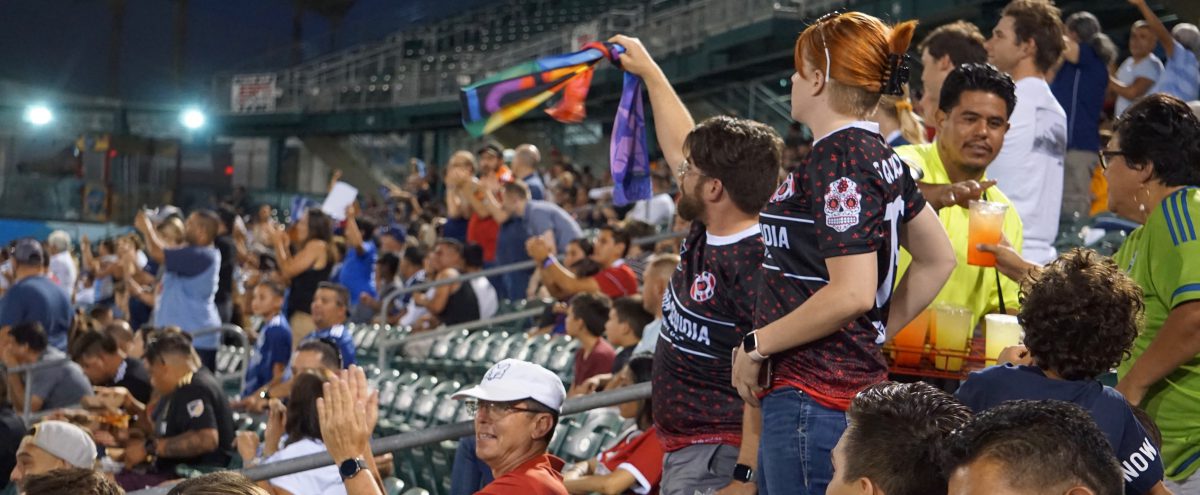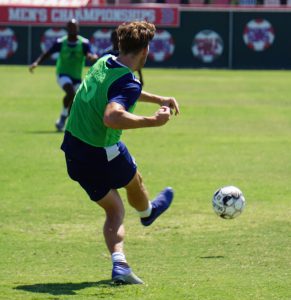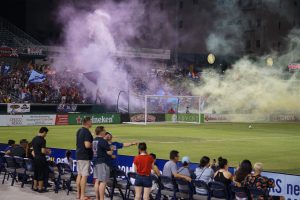
The crowd at Chukchansi Stadium cheers the Foxes' early goal against the Real Monarchs Aug. 16 in 2019. The game ended in a tie. Photo by Edward Smith
Hot off a win against Colorado Springs, Fresno’s first professional soccer team has achieved eights wins, one tie and one loss in its last 10 matches. Able to not only score, but also keep other clubs from doing so, the Fresno Foxes have lost only three matches in 22 league games, putting them in second place for the Western Conference and eligible for home field advantage during playoffs come October.
Despite the team’s performance in only its sophomore year, stagnant attendance, the loss of affiliation with Major League Soccer’s Vancouver Whitecaps FC and the need for a stadium ahead of a deadline from the United Soccer League have pitted the Foxes into a race against the clock.
“We’ve got the sponsorship. We’ve got the team. We’ve got the management. We’ve got the staffing,” said Ray Beshoff, owner of the Fresno FC. “We’re missing the fans.”
Break-even point
Since the team’s debut last year, attendance has stayed around the same, averaging 3,500 a game, Beshoff said. They need to be averaging 5,000 a game to break even. On the plus side, however, they have been giving away very few free tickets, Beshoff said, meaning most of the tickets are now paid for.
“Financially, we’re going to lose less money this year than last year, so we’re trending correctly,” he said.
With the lively “Fire Squad” fan group kicking off home games with drum lines and smoke bombs, Beshoff said people have a terrific time at the games. But he wonders if people’s preconceptions about Downtown Fresno keep them from coming.
Beshoff brought the Foxes to Fresno in 2018 out of his own love for the beautiful game. Considering the 1 million-plus population in Fresno County, and the large Hispanic population, he thought the shared love for the sport he grew up would translate into a booming franchise.
In search of a home
In other parts of the country, soccer is thriving. The 33 professional teams in the USL played host to 2.75 million fans in 2018, according to a report from the league. Since at least 2015, attendance has increased at least 30% year-over-year. And the Foxes are not alone among teams seeking to capture the growing market. Seven new teams entered the USL Championship League in 2019, with six teams entering in the 2018 season.
Twenty-two cities of the 36 Championship franchises already have stadiums for their own teams, according to the USL report. And with three more under construction and another three clubs with proposals, the number of teams without “soccer-specific stadiums” continues to shrink.
When the league debuted in 2010, the 10-year strategy was to have all teams in a stadium of their own by 2020, said USL President Jake Edwards in an Aug. 8 interview with The Athletic.

But with the influx of new teams and an uptick in demand, that timeline was extended to 2026, to coincide with the World Cup being hosted by North American countries.
“Ultimately, what we want as a league on the rise is for fans to have a home and a place that they know they can go root for their club,” said Court Jeskee, executive vice president for the USL.
Trouble with sharing
Playing in baseball stadiums means coordinating with hosts for field-time. The goal is often to schedule two matches while the baseball team plays away games.
“Your coaching staff has two games in a three-or-four day period, which sometimes can put a strain on the soccer side of the business,” Jeskee said.
Additionally, fields have to be adapted for play between the two games. It can cost $15,000 a match to remove the mound and adjust the pitch — what footballers call the field.
At this point, Beshoff has left most of the operations to Frank Yallop, general manager for the Foxes, while he searches for a stadium. He’s tried Fresno State, but he said concerns about field condition kept that deal from moving forward. Representatives from Fresno State did not reply to requests for comment.
While Jeskee said cities across the country are looking to install stadiums capable of seating crowds between 12,000-15,000, the Foxes say they are looking in the range of 4,000-8,000. Beshoff estimates a stadium would cost $10 million.

Other cities have begun breaking ground on their own stadiums. Taxpayers footed a $14 million bill in Hartford, Connecticut to rehabilitate a stadium there for their soccer club, according to the Associated Press.
In Louisville, the state of Kentucky approved $21.7 million in financing from future tax revenue to accompany a $30 million bond from the Louisville Metro Government on a projected $193.1 million stadium, according to the Courier Journal.
Teams in Indianapolis, Oklahoma City and Colorado Springs all have proposals of their own submitted, the report from the USL stated.
No parent team
The need for a stadium and stronger attendance also comes at a time that the Foxes Major League Soccer affiliate left to create their own farm team closer to home.
While this means the team has taken on more of the expenses, Head Coach Adam Smith feels it has given the club more control.
“The negative is the financial implications because we have to pay for every player, and they gave us help with coach’s salaries as well — that’s the negative implication,” Smith said. “The positive implication is I get to choose who I want.”
And the active recruiting the team has done has lead to players coming in from Brazil, Argentina, England, Scotland and Mexico.
Having the control over scouting has led to a deeper bench, he said, so that when they have an injury, he can rely on the next guy coming in to perform as hard as the first.
Smith said for a breakout team like Fresno’s, the club is on track for success. Establishing a strong staff in the first year lead to playoff contention for the championships in the second year. Beshoff agrees.
“I can’t ask the soccer side to do anymore than they’ve done,” Beshoff said. “They’ve really done a great job bringing a winning team. Now I need the city of Fresno to step up and come out and support them.”
The team’s next home game will be on Sept. 18 against Rio Grande Valley. For tickets, go to the Fresno FC website.









